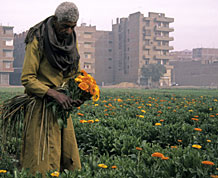HELWAN
The GIZ supports the Participatory Development Programme in Ezbet and Arab el-Waldah, in the District of Helwan, Southern Cairo. The Integrated Care Society, an NGO, initiated the upgrading project.
The population of Helwan’s agricultural areas has doubled more than seven times due to migration from rural Egypt since the 1970s. The neighbourhoods are now densely populated illegal settlements. Surrounding agricultural land is under threat. Residents suffer from inadequate services, utilities, postal and telephone systems, and have no police station, ambulance service, market places, or bakeries. Schools are few and no secondary schools exist in the areas. Illiteracy rates are high as are unemployment rates, especially among women. Child labour is common. Addiction, religious extremism, and criminal behaviour are widespread. There are few civil society organizations and a lack of development-oriented organisations. Environmental pollution exists, particularly from uncollected rubbish and industrial effluents.
However, the neighbourhoods of Ezbet and Arab el-Waldah have a population of about 100 000, a manageable size for development activities. It is a youthful and energetic populationâ30% of residents are under 15 years oldâthat will demand services and housing. Existing institutions such as mosques can be used to disseminate information and be a focal point for development related issues and values. Existing infrastructure is good since houses are connected to water and sewage networks and supplied with electricity, albeit sometimes at a substandard level.
Projects in Ezbet and Arab el-Waldah include:
